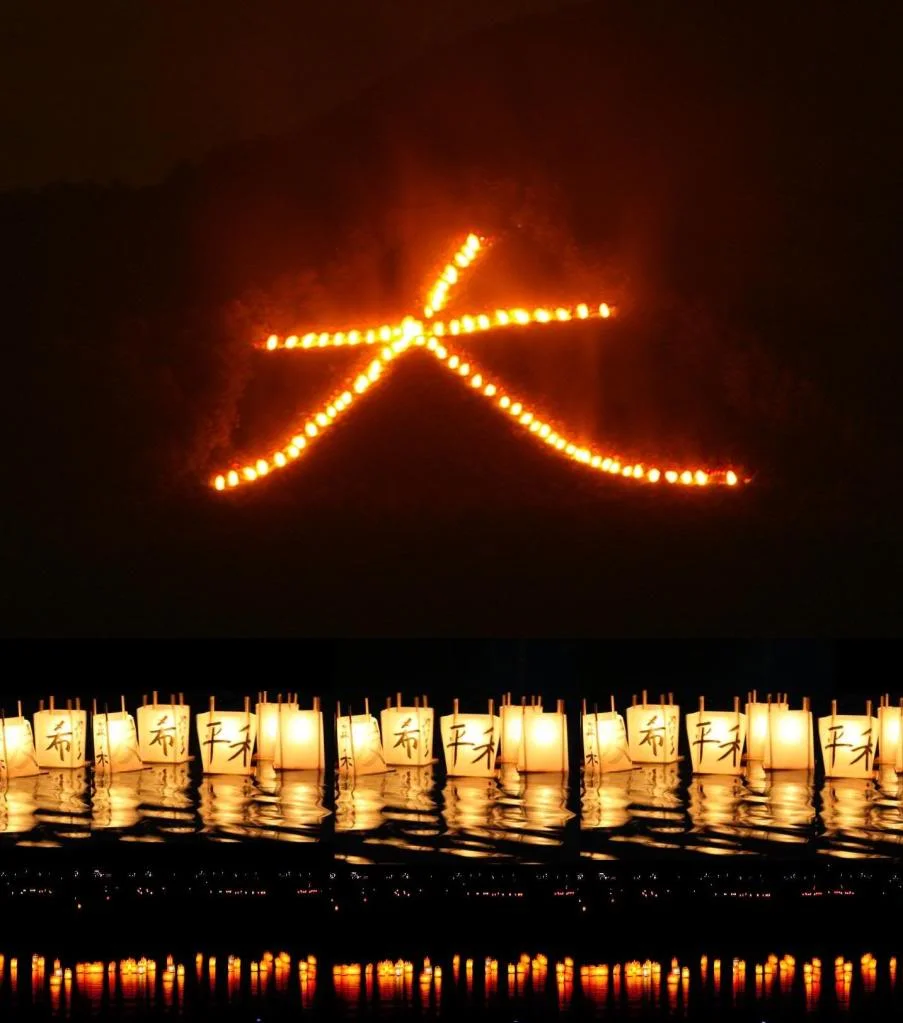Touronagashi: floating lanterns in honor of ancestral spirits, an Obon tradition. Photo (c)2011 Stu Levy.
Summer in Japan: Hot Times and Family Memories
by Michelle "Ms. Geek" Klein-Hass
Summer in Japan makes Summer in the Southeastern US seem positively mellow by comparison. Japan is considered a Sub-tropical climate, although it does get snow in Winter in most areas. During the period from May through October, a changing aggregate of conditions make for rainy, hot and sticky weather, punctuated by the occasional typhoon.
Long before the advent of air conditioning, which is pretty much ubiquitous in Japan, the Japanese people needed to learn to cope with their hot, sticky Summer climate. To that end, the whole period is liberally scattered with outdoor festivals. When it's too hot to sleep, you take your mind off of the misery by going to visit shrines, temples, and town squares, where street food, drink and dancing help make the hot season bearable. The traditions have held to this day.
The two major festivals are Tanabata, which is a predominantly Shinto festival; and Obon, which is more Buddhist in nature. In both cases, however, there is enough cross-pollenation between the two traditions to where it's hard to tease what's Buddhist and what's Shinto apart in both festivals.
Tanabata is a festival about long-distance love in the cosmos. The goddess that lives in the star Vega, Orihime, is in love with the god that lives in the star Altair, Hikoboshi. When Vega and Altair get close in the sky, the festival is celebrated. Most Tanabata festivals are conducted around the month of July, although in Sendai city in the Tohoku region, their Tanabata happens in early August. The festival is punctuated by fireworks displays and the display of gorgeous, huge hanging paper art objects called Fukinagashi.
In Los Angeles, we have our own Tanabata celebration, which is held at the beginning of Nisei Week in Little Tokyo. The merchants of the LT make Fukinagashi, and compete for the most ornate and spectacular ones.
Tanabata in Little Tokyo, during Nisei Week. Photo (c)2014 Michelle Klein-Hass
Wishes are written on little slips of paper, and tied to bamboo poles by strings or ribbons. These poles become almost tree-like after many people leave their wishes. The traditional things to wish for are success in school and taking tests, business success and for new love.
A tree bristling with wishes in the LT. (c)2014 Michelle Klein-Hass
Obon, on the other hand, is a joyous occasion with a serious dollop of awareness of mortality. In some respects, it is like the traditional Pre-Christian celebration of Samhain in Ireland, or Dia De Los Muertos in Mexico. It is believed that ancestral spirits are closest to their living relatives during Summer, and this is a time to honor their memories by dancing, and by Buddhist ceremonies.
Obon is also celebrated a lot more in the United States by Japanese-Americans, because Buddhism translated better to life abroad than Shinto. Almost every Japanese Buddhist temple in the US has Obon dances and carnivals. Obon "Season" in Japanese-American life extends from June through to late August, and the dances and carnivals usually run over a given Summer weekend. Nisei Week, a big event in Little Tokyo, Los Angeles, CA, is technically an Obon celebration but which actually now extends a whole month, and is marked by parades, festivals, (including the Tanabata festival) art exhibits, concerts, and even a beauty pageant.
In Japan, Obon is a big deal. It runs between August 13th and August 16th, and everyone gets that time off so that they can spend it with their families. People travel to their hometown, especially when that hometown is the location of the family grave. The family Butsudan (Buddhist altar) is cleaned up and spruced up for the occasion, and the family grave is also cleaned and the ground weeded. In some areas, huge bonfires are lit to attract the spirits home.
Obon bonfire in Kyoto. The character the bonfire is shaped like is "Dai" meaning both "Big" and "Generations."
Japanese firefly. (hotaru)
Minor traditions in Summer include going out to view fireflies, (hotaru) and eating special summer foods like the street food you find at fairs, shaved ice with lots of traditional toppings, cold somen noodles, and on the hottest day of the year, Unagi (freshwater eel) Donburi. (Rice Bowls) The very latter tradition is in danger because overfishing and the inability to breed Unagi in captivity has endangered the eels.
Food booths.
Even if the Summer weather in Japan wasn't so hot and sticky, people would likely spend all night partying at Summer gatherings anyway. They make memories that last a whole lifetime, and are passed from generation to generation. And the Japanese diaspora has passed the traditions to new lands, including the US.









